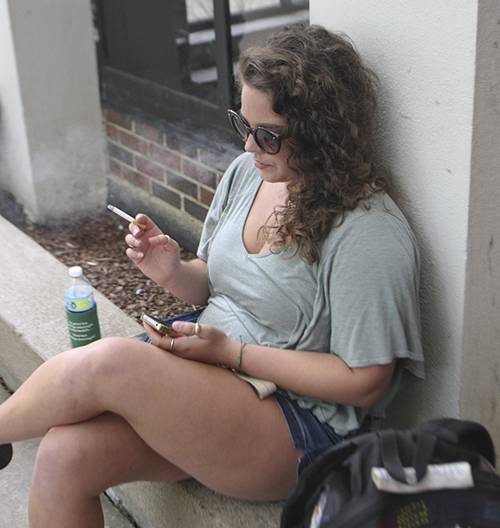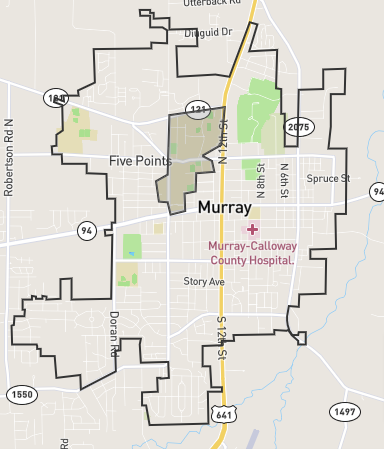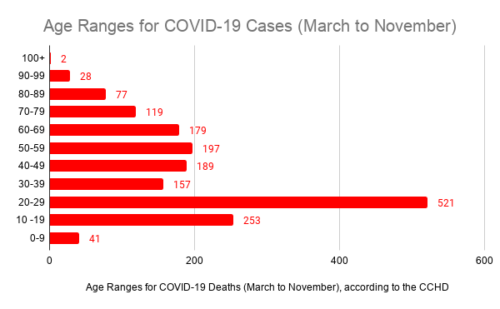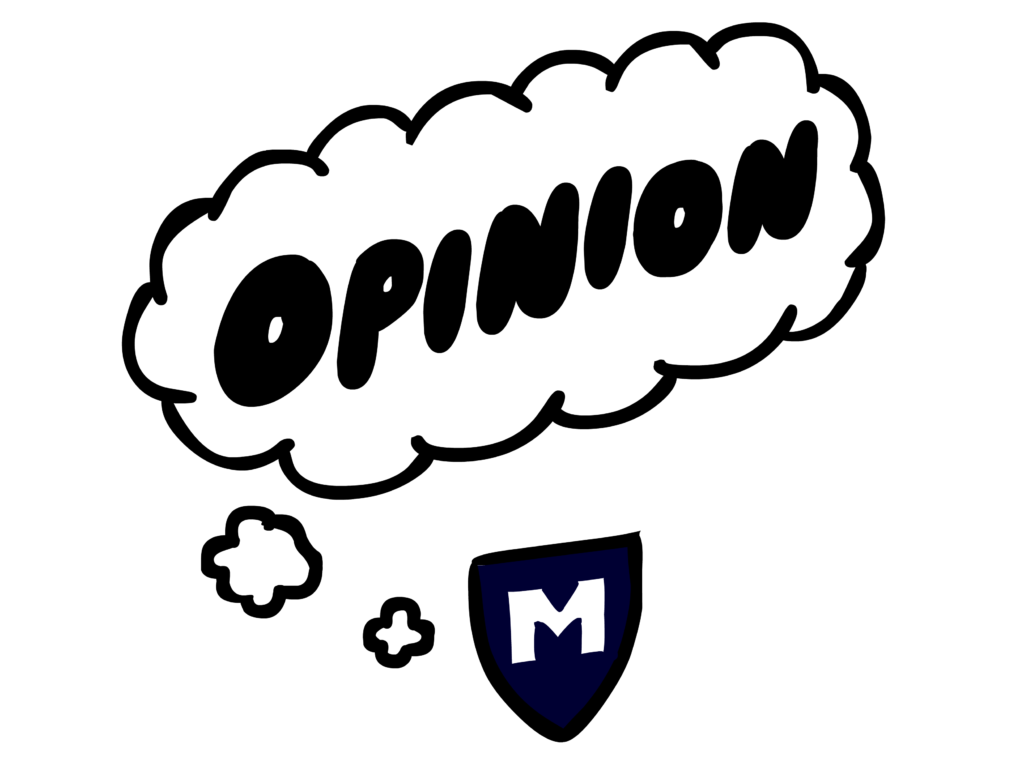
A student sits outside of Faculty Hall between classes. Students, faculty and staff can’t smoke on the side of the building that faces 16th Street.
In light of Gov. Steve Beshear’s recent executive order banning smoking on government property, the University’s potential to instill a smoking ban of its own has lit up debates all over campus.
On Sept. 4, Beshear signed an executive order requiring government property including sidewalks, parking lots, state vehicles and lawns to be smoke free, effective Nov. 20, affecting more than 33,000 state workers.
Nearly 5,000 state employees use tobacco products, but Murray State’s students, faculty and staff will not be affected by the order.
As the only Kentucky university without some form of smoking ban, President Bob Davies and the University may make the move to create a ban of some form by the start of the next year or by the beginning of the new academic year.
Before Beshear’s executive order, the Faculty and Staff Insurance and Benefits Committee designated a Smoking Committee to make a recommendation of a possible smoking or tobacco ban to the University.
The Insurance and Benefits Committee is responsible for making recommendations concerning group health and life insurance and other benefits for faculty and staff, according to the 2014 Faculty Handbook.
Davies said he gave the group the assignment because it includes representatives of all three University bodies: Faculty Senate, Staff Congress and the Student Government Association.
“I will be asking them for a recommendation from the (Smoking Committee) to the Insurance and Benefits Committee and then to my desk that would say, ‘we recommend to keep it as is, we recommend smoke-free, we recommend tobacco free,’’ Davies said. “It’ll be one of those three.”
Davies said discussing the smoking or tobacco policy on campus is a tangled web with health, cost and cleanliness issues.
Davies said there have been many other conversations brought up regarding tobacco, including donations from tobacco companies to Murray State.
He said he doesn’t believe donations will be dropped because other universities in tobacco producing areas have smoke or tobacco-free and also continue to receive contributions.
Davies said the University will provide services to help people quick smoking if they need it.
“Part of the efforts, if it comes out that we’re going smoke-free or tobacco-free or whatever combination there of, is we as an institution need to have programs in place by working with the Wellness Center and Health Center to provide opportunities for people to not have to go cold-turkey,” Davies said.
Clinton Combs, junior from Benton, Ky., is one of two SGA senators involved in the Smoking Committee.
“The President’s Office wants (the committee) to have a recommendation made by the week of Nov. 17, also around the time the executive order from Beshear goes into effect in Kentucky,” Combs said. “He wants us to be able to present to the Insurance and Benefits Committee with a recommendation by that time, so then it can go to the Board of Regents meeting on Dec. 5.”
Combs said the possible ban could be either a smoking ban or tobacco ban.
He said a smoking ban would include tobacco in the form of cigarettes, pipes, cigars, hookah and e-cigarettes, essentially anything that is or simulates smoking.
A tobacco ban would include chewing tobacco and anything that is a tobacco product.
“I want people to keep in mind that we want to best represent what the students want,” he said. “If people have any opinions of this that they want to get to the committee, we urge them to talk to their SGA representative or come to an SGA meeting. “I want to make sure that this goes in favor of what the students want.”
There are 1,372 total colleges and universities nationally that are smoke-free, 938 are tobacco-free and 167 do not allow e-cigarettes, according to Americans for Nonsmokers’ Rights.
Max Crofton, sophomore from Murray, said a smoking ban is necessary to ensure the health of students on campus and said it is surprising to him that Murray State has yet to have a ban when it is common among other campuses and states.
“Many of us find it hard to believe that now, with all the smoking hazards and advertisements telling us how wrong smoking is, that at a higher learning facility such as Murray State, that it is still allowed,” Crofton said. “I can’t walk across campus and not smell smoke.
“It’s everywhere and it’s ridiculous. Faculty Hall, the library, Fine Arts. You can’t get away from it.”
Crofton said he believes Murray State is falling behind society as more institutions begin to have smoking or tobacco policies.
He said it is strange to him that Murray State is only University left to impose a ban of some type, and the University would be better off with a smoking ban.
“Smoking harms so much more, not just the one smoking, but the people around them,” he said. “Especially when the rest of the world is telling us to stop smoking, it would make sense for a place of higher learning to do the same.”
John Wyatt, freshman from Calvert City, Ky., said a ban would hurt smokers because of their addictions.
“It’d definitely hurt some people,” he said. “For those people that are hard stuck on nicotine, they’ve got to have cigarette every now and again.”
Wyatt said he began smoking socially, and as he saw his own friends begin to pick up the habit, he did, too.
However, he said if a smoking ban had been established on campus before he started classes, he might not have started the habit.
“I probably wouldn’t have messed with it,” he said. “I don’t have anywhere to smoke off campus because I don’t smoke in my car or in my house.”
Wyatt said he thinks a smoking ban could help Murray State students, but argues that it would lead to lower academic performances for those students who do smoke freely on campus now.
He said a smoking ban is both an invasion of personal freedoms and a protection of health but believes smokers should have the right to smoke if they so choose.
“If you’re thinking about everybody’s health in general, it would be better (to have a ban),” Wyatt said. “But if you’re thinking of the people that are going to have to sit and wait six hours that are really addicted to nicotine, they’re not going to be able to focus in class and their grades will drop.”
Story by Mary Bradley, Assistant News Editor































































































